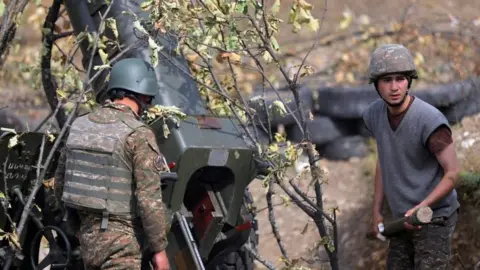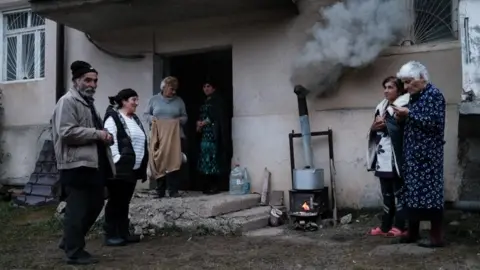Nagorno-Karabakh: Nearly 5,000 dead in conflict, Putin says
 EPA
EPARussian President Vladimir Putin has said that almost 5,000 people have been killed in fighting between Azerbaijan and Armenian forces over the disputed Nagorno-Karabakh region.
This is far higher than the death toll given by the two sides.
Mr Putin said that he speaks to the two sides several times a day, and would not be taking sides in the conflict.
He said that Moscow disagrees with Turkey - which supports Azerbaijan - over the conflict.
The Russian president also called on the United States to assist in seeking peace in the region.
Armenia and Azerbaijan have accused each other of violating humanitarian ceasefires in Nagorno-Karabakh.
Fighting flared last month over the territory, which is internationally recognised as part of Azerbaijan but run by ethnic Armenians.
This is the worst violence in the region since a six-year war over the territory ended with a ceasefire in 1994.
What did Putin say?
Russia is in a military alliance with Armenia and has an army base in the country. But it also has close ties with Azerbaijan.
"There are a lot of casualties from both sides, more than 2,000 from each side," the Russian president told a televised meeting, adding that the number was "nearing 5,000".
This is far higher than previous estimates, with the most recent official death toll at under 1,000.
Nagorno-Karabakh's governing authorities said 874 of its military personnel and 37 civilians have lost their lives since 27 September. Azerbaijan says 61 Azeri civilians have been killed, but has not announced its military casualties.
Mr Putin added that he was in "constant" communication with Armenian Prime Minister Nikol Pashinyan and Azerbaijan's President Ilham Aliyev and would not be taking sides.
"I talk to them on the phone several times a day," he said.
Mr Putin said he disagreed with Turkey over the conflict, adding that Turkish President Tayyip Erdogan "might seem tough, but is a flexible politician and reliable partner for Russia".
Turkey has vowed to send soldiers and provide military support for Azerbaijan if requested.
 EPA
EPAMr Putin also called on the US to "work in unison" with Russia to end the fighting.
Talks between Armenia and Azerbaijan are expected to take place in Washington on Friday, when US Secretary of State Mike Pompeo is due to meet the foreign ministers of the two countries.
The US, Russia and France are co-chairs of the OSCE Minsk mediation group, which has called for a ceasefire.
What's the latest in Nagorno-Karabakh?
Despite a Russian-brokered truce agreed at the weekend, the fighting has continued and hundreds have died.
Azerbaijan reported fighting in several areas on Thursday, and accused Armenia of firing three ballistic missiles into Azerbaijan. Armenia denied this.
Armenia also reported fighting in multiple locations, while officials said the town of Martuni and nearby villages had been shelled.
Armenia's prime minister has said there is no diplomatic solution "at this stage".

Nagorno-Karabakh - key facts
- A mountainous region of about 4,400 sq km (1,700 sq miles)
- Traditionally inhabited by Christian Armenians and Muslim Turks
- In Soviet times, it became an autonomous region within the republic of Azerbaijan
- Internationally recognised as part of Azerbaijan, but majority of population is ethnic Armenian
- An estimated one million people displaced by war in 1988-1994, and about 30,000 killed
- Separatist forces captured some extra territory around the enclave in Azerbaijan in the 1990s war
- Stalemate has largely prevailed since a 1994 ceasefire
- Turkey openly supports Azerbaijan
- Russia has military bases in Armenia
